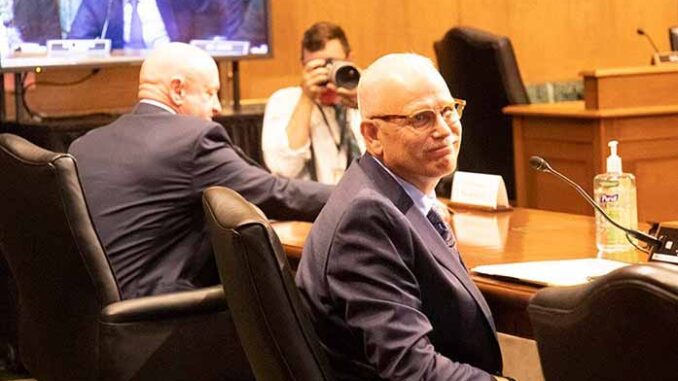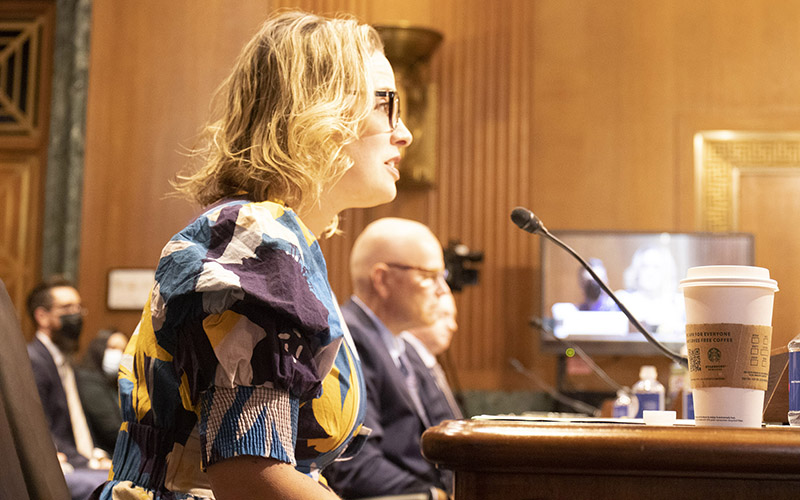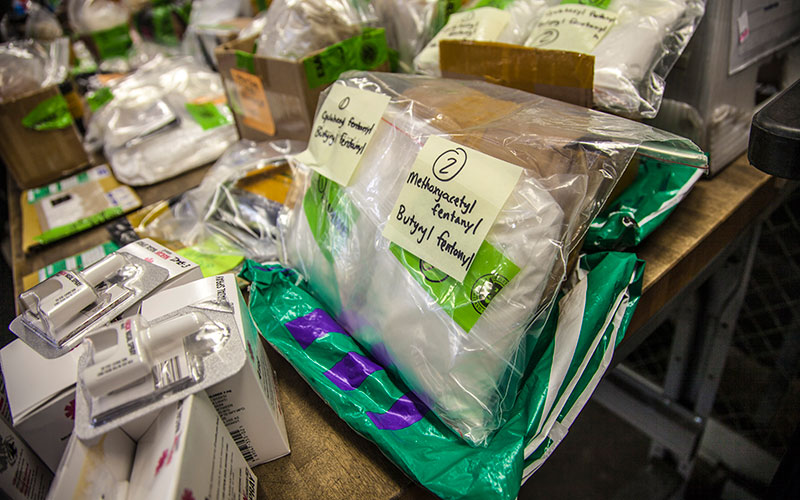
WASHINGTON – Tucson Police Chief Chris Magnus walked a fine line in a hearing Tuesday on his nomination to lead Customs and Border Protection, easily fielding questions from Democrats while telling GOP senators some of what they wanted to hear.
Republicans could not get Magnus to say there is a “crisis” at the border, but he did agree that COVID-19 vaccinations for immigrants would be reasonable and that a border wall would make sense in some areas, along with better technology for Border Patrol officers.
Mostly, Magnus said he wanted to work with others, both in Congress and in CBP, to find solutions to the challenges the agency faces, from border security to battling forced labor and intellectual property theft.
“If we spent a little less time debating on what the terminology is and perhaps a little more time trying to fix a broken system and working together, we could address what I’ve already acknowledged is one of the most serious problems that we face right now in our nation,” Magnus said.
Despite the sometimes-rough questioning from Republicans on the Senate Finance Committee, one analyst said she expects his nomination to advance.
“He strikes an important balance for both the moderate and more left-wing parts of the Democratic Party in that he clearly believes in border security, but on the other hand, he is also the most progressive nominee put forth for CBP,” said Jessica Bolter, associate policy analyst at the Migration Policy Institute.
The hearing comes during an unprecedented surge of apprehensions of immigrants trying to cross the southern border. More than 1.5 million people had been stopped by Border Patrol through August, with one month still to go in fiscal 2021, already more than in fiscal years 2019 and 2020 combined.
Republicans laid the blame at the feet of President Joe Biden, saying his decisions to stop construction of the border wall and end the Trump administration’s “remain in Mexico” policy, among other changes, had sparked a crisis at the border.
Sen. Todd Young, R-Ind., repeatedly asked Magnus if he believed there to be a crisis at the border. When Magnus refused to give a yes-or-no answer, Sen. Tim Scott, R-S.C., pressed the issue.
“Millions of Americans, literally millions upon millions of Americans, have come to the same conclusion that I have, and that Senator Young has, and frankly I think the administration is coming to the same conclusion, that there is a crisis on our southern border,” Scott said.
“When we have 200,000 folks illegally crossing our border in just July, more than a million in the last fiscal year, there is a crisis on our border,” he said. “Why admitting that there is a crisis on our border is a problem, I don’t fully appreciate.”
Magnus also came under fire for his criticism of the Trump administration’s decision to send Department of Homeland Security officers into Portland to protect the federal courthouse there during the height of the 2020 protests, even though city and state officials opposed the deployment.
Senators also pointed to a 2017 New York Times editorial by Magnus criticizing the Trump administration’s attempt to withhold federal funding from “sanctuary cities,” a move Magnus said – in the article and on Tuesday – would hurt public safety.
Democrats on the committee were more like Sen. Ron Wyden, D-Ore., who said the Trump administration “made it fashionable to believe that enforcing our immigration laws required abusing immigrants and asylum seekers at the border.”
“Enforcing our immigration laws and treating people humanely, those two goals are not mutually exclusive,” said Wyden, the committee chairman. “We can do both, and we’re going to insist on both.”
Wyden noted that immigration is not part of the Finance Committee’s purview and urged Magnus to focus on forced labor – something Magnus said is a particular goal.
If approved, Magnus would be going from running the Tucson Police Department, which has just over 1,100 employees, to running the 60,000-employee CBP, the largest police force in the nation. More than once during the hearing, Magnus deflected questions about specific parts of the agency, saying he was still learning about it.
But Arizona Sens. Kyrsten Sinema and Mark Kelly, both Democrats, praised Magnus as an “exceptional nominee,” saying he has experience at both the northern and southern borders that will help him in this position.

Sen. Kyrstan Sinema, with fellow Arizona Democratic Sen. Mark Kelly, far right, called Tucson Police Chief Chris Magnus an “exceptional nominee” to be the next commissioner of Customs and Border Protection. (Photo by Genesis Sandoval/Cronkite News)
“Having someone like Chief Magnus leading CBP is the best way our nation can better secure our border, better protect our communities, and ensure that migrants are treated fairly and humanely,” Sinema said.
Kelly echoed that statement.
“In southern Arizona, we have gotten to know Chief Magnus as a committed public servant with the grit and experience to take on this job,” he said. “I know through this confirmation process, this committee and the Senate will see that as well.”
Magnus has spent 41 years in public safety, working as a dispatcher and paramedic and then as a police officer in local departments in his home state of Michigan, North Dakota and California. He became chief in Tucson in 2016.
During questioning Tuesday, he returned more than once to the importance of enforcing the law.
“It’s essential to recognize that what we think of the border is not homogenous, and there’s not one solution that will provide us with perfect border security,” he said. “So if confirmed, I will do what I’ve always done in my professional career, which is to uphold the law.”
Wyden did not set a date for a committee vote, but said he wants to move quickly on what he called “a very important nomination.” Bolter said she expects Magnus, who was nominated more than six months ago, will be approved.
“We won’t know for sure, but I think that there’s nothing to indicate that his confirmation will be a problem,” she said.

